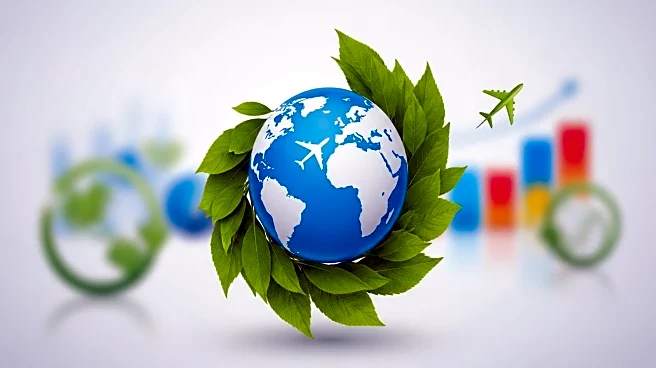What is the story about?
What's Happening?
The World Travel & Tourism Council (WTTC), in collaboration with Omran, has released its Environmental & Social Research (ESR) 2025 report, highlighting a significant reduction in emissions intensity within the global travel and tourism sector. Despite surpassing pre-pandemic economic levels, the sector's carbon footprint remains below 2019 figures. The report indicates a 9.3% decrease in global greenhouse gas emissions since 2019, with the sector now accounting for 7.3% of total global emissions, down from 8.3%. This reduction is attributed to improved efficiency, including a 16.6% increase in low-carbon energy adoption and a 5.7% decrease in fossil fuel use. The sector's GDP footprint has grown by 6% beyond its pre-pandemic peak, reaching $10.9 trillion. The report also emphasizes the sector's social impact, noting an increase in employment opportunities, particularly for women and youth.
Why It's Important?
The findings underscore the potential for economic growth to coexist with environmental responsibility. The travel and tourism sector's ability to reduce emissions while expanding economically serves as a model for other industries. This development is crucial as it demonstrates that sustainable practices can lead to both economic and social benefits. The sector's contribution to job creation, especially for marginalized groups, highlights its role in promoting social inclusion. Additionally, the increase in tax revenues generated by the sector, which reached $3.5 trillion in 2024, underscores its economic significance. Policymakers are urged to recognize these contributions and reinvest tourism-generated revenues into local communities and infrastructure to further enhance environmental and social outcomes.
What's Next?
The WTTC calls for continued efforts to accelerate sustainable practices within the travel and tourism sector. Key areas of focus include the adoption of sustainable fuels, renewable energy, and low-carbon infrastructure. Public-private partnerships are deemed essential to achieving these goals. The sector's future success will depend on its ability to maintain its trajectory of reducing emissions while fostering economic and social progress. Policymakers are encouraged to support these initiatives by acknowledging the sector's contributions and strategically investing in sustainable development.
Beyond the Headlines
The report highlights the ethical and cultural dimensions of sustainable tourism, emphasizing the importance of balancing economic growth with environmental stewardship. The sector's progress in reducing emissions intensity sets a precedent for other industries, potentially influencing broader shifts towards sustainability. The focus on social inclusion and job creation for women and youth reflects a commitment to equitable growth, which could inspire similar efforts in other sectors. The WTTC's partnership with Omran and other stakeholders exemplifies the collaborative approach needed to drive meaningful change.


















